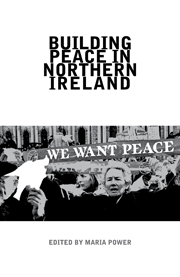Book contents
- Frontmatter
- Contents
- Acknowledgements
- Contributors
- 1 Introduction: Peacebuilding in Northern Ireland
- 2 Understanding the Role of Non-aligned Civil Society in Peacebuilding in Northern Ireland: Towards a Fresh Approach
- 3 The Role of Civil Society in Promoting Peace in Northern Ireland
- 4 The Contribution of Integrated Schools to Peacebuilding in Northern Ireland
- 5 Providing a Prophetic Voice? Churches and Peacebuilding, 1968–2005
- 6 ‘Peace Women’, Gender and Peacebuilding in Northern Ireland: From Reconciliation and Political Inclusion to Human Rights and Human Security
- 7 Encumbered by Data: Understanding Politically Motivated Former Prisoners and the Transition to Peace in Northern Ireland
- 8 Loyalism and Peacebuilding in the 2000s
- 9 Civil Society, the State and Conflict Transformation in the Nationalist Community
- 10 Examining the Peacebuilding Policy Framework of the Irish and British Governments
- 11 Building Peace and Crossing Borders: The North/South Dimension of Reconciliation
- 12 Peace Dividends: The Role of External Aid in Peacebuilding
- Index
4 - The Contribution of Integrated Schools to Peacebuilding in Northern Ireland
- Frontmatter
- Contents
- Acknowledgements
- Contributors
- 1 Introduction: Peacebuilding in Northern Ireland
- 2 Understanding the Role of Non-aligned Civil Society in Peacebuilding in Northern Ireland: Towards a Fresh Approach
- 3 The Role of Civil Society in Promoting Peace in Northern Ireland
- 4 The Contribution of Integrated Schools to Peacebuilding in Northern Ireland
- 5 Providing a Prophetic Voice? Churches and Peacebuilding, 1968–2005
- 6 ‘Peace Women’, Gender and Peacebuilding in Northern Ireland: From Reconciliation and Political Inclusion to Human Rights and Human Security
- 7 Encumbered by Data: Understanding Politically Motivated Former Prisoners and the Transition to Peace in Northern Ireland
- 8 Loyalism and Peacebuilding in the 2000s
- 9 Civil Society, the State and Conflict Transformation in the Nationalist Community
- 10 Examining the Peacebuilding Policy Framework of the Irish and British Governments
- 11 Building Peace and Crossing Borders: The North/South Dimension of Reconciliation
- 12 Peace Dividends: The Role of External Aid in Peacebuilding
- Index
Summary
This essay will explore the contribution of integrated (mixed Catholic and Protestant) schools to peacebuilding in Northern Ireland and it will highlight some of the challenges ahead in an increasingly diverse society with a legacy of conflict. It draws on and is illustrated by exemplars from the extensive data that I have gathered over more than ten years. The essay will focus on three particular areas – the long-term impact of attending an integrated school, variation in leadership approaches to integration within the schools and emergent models of good practice in response to the cultural diversity of students. A number of theoretical perspectives will be brought to bear upon the data, including social identity theory and political science perspectives on multiculturalism. I will argue that integrated education provides a unique opportunity, in a still segregated society, for children and young people to learn from each other, enjoy sustained engagement and interaction with other perspectives, develop empathy and build long-term friendships across the divide. At the same time, I will question whether the current approaches to integrated education hold equal possibilities for peacebuilding.
The context for peacebuilding through education
In divided societies like Northern Ireland, emerging from a period of intense community violence, the role of education in peacebuilding is complex and needs to be carefully contextualised not least historically, politically and socially. Looking first at history we see that prior to partition in 1922, the six counties of Northern Ireland shared a general Irish education system based on the National School system.
- Type
- Chapter
- Information
- Building Peace in Northern Ireland , pp. 53 - 72Publisher: Liverpool University PressPrint publication year: 2011



